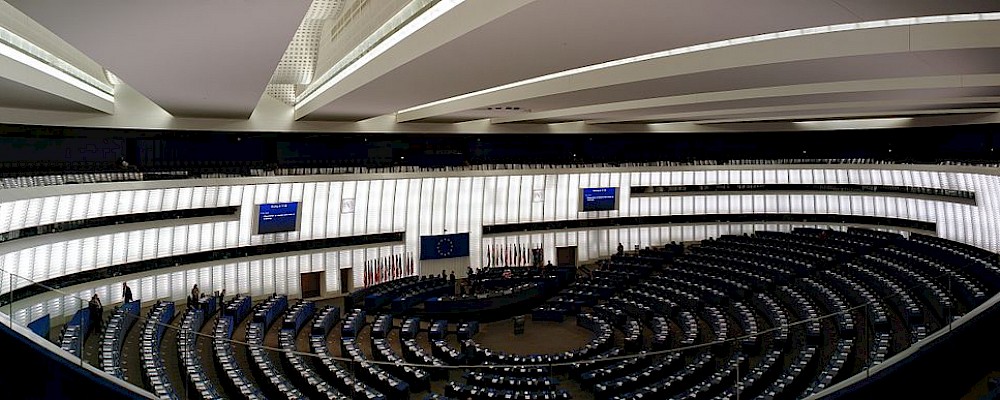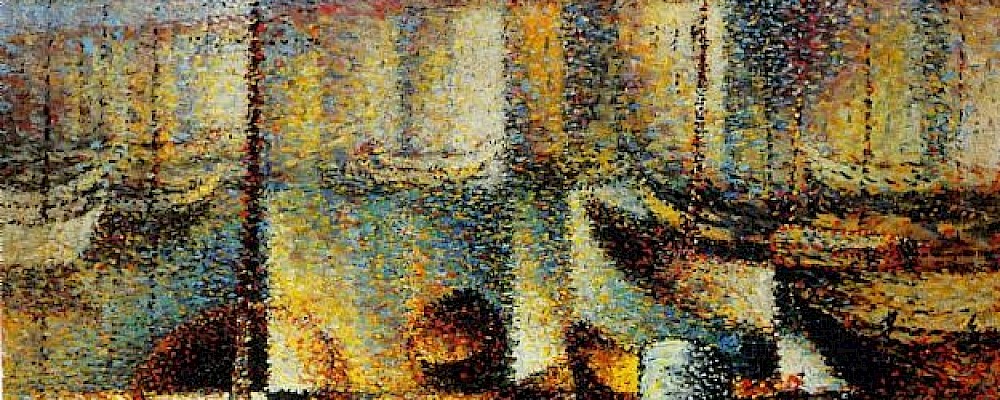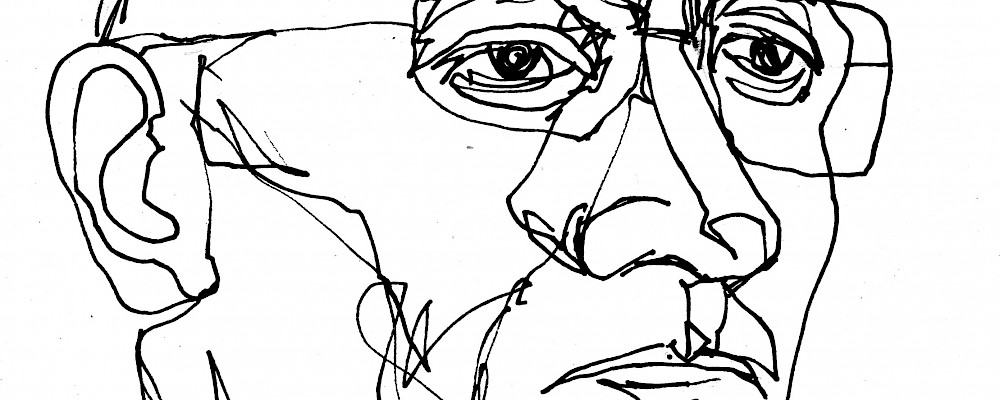The Absence of Conflict: Chantal Mouffe and the European Parliament
The European Union is often called an undemocratic (and bureaucratic) monster, left-wing debates in particular are dominated by narratives like this. But how could a leftist approach to the EU look like?

Against the background of these questions I propose an analysis of the European Parliament in terms of Chantal Mouffe’s theory of Agonistic Pluralism, enriched by other leftist debate contributions. With respect to the complexity of the European institutional framework, it is obvious that writing an article like this is more aimed at highlighting some insights rather than claiming completeness of the analysis.
Agonism or Antagonism
Mouffe’s conception is mainly shaped by the assumption that democracies are always marked by conflict. Every (political) decision for an action is at the same time a decision against its (unrealized) alternatives; it is an expression of power (more precisely: exclusion) (Chantal Mouffe: Agonistics: Thinking the World Politically). Taking into account the various social and political forces, a pluralistic democracy is characterised by the permanence of conflict (Chantal Mouffe: The democratic Paradox).
“Consequently, the crucial question of democratic politics is not to reach a consensus without exclusion which would amount to creating a ‘we’ without a corollary ‘they’ but to manage to establish the we/they discrimination in a manner compatible with pluralism.” (Chantal Mouffe: Agonistic Democracy and Radical Politics)
According to Mouffe, the distinction between us and them can take different forms: the excluded can be perceived as an enemy or an adversary. The latter is called agonism and the first antagonism. An antagonistic relationship roughly means that an actor tries to destroy the other. In an agonistic relationship the opponent is someone who has the right to defend her ideas while ‘we’ are trying to fight those ideas (Mouffe: Paradox). In Mouffe’s theory, the liberation of the public from conflict leads to its postponement because the conflict can actually never be resolved. A conflict-free sphere of the political would rather result in a form of conflict that is conducted in a moralised way. Hence, the opponent would no longer be fought in the political arena but be morally discredited and excluded from the political debate. A paradigmatic example is the distinction between the good democrats and the bad right-wing parties (Chantal Mouffe: Democracy in Europe: The Challenge of Right-wing Populism).
The European Parliament
Roughly speaking, there are two cleavages that shape the ideological conflicts of the European Parliament (EP). There is the classical socio-economical line of conflict between the right and the left and the struggle over the question of European Integration (often framed as euroscepticism vs. europhoria). But the EP is not a classical parliament. Thus, I shall now try to highlight some of its peculiarities and those aspects that are usually considered as problematic (or undemocratic): First, the European ‘government’ – that is, the Commission – is not formed on the basis of the prevailing majority in the EP, so that it is not necessary to form a government coalition (which at the same time means that there is no effective control of the ‘government’ by the EP). The EUR-Lex glossary on the democracy deficit states: “EU voters do not feel that they have an effective way to reject a ‘government’, they do not like, and to change, in some ways, the course of politics and policy.” Second, the European parliament has no right of legal initiative. Its role in the decision-making process is severely limited, writes Ulrike Guérot in the Guardian: “Most citizens feel excluded from EU decision-making. They have only indirect sway. They elect the European parliament, but that body holds little power.” Third, all MEPs have a common interest in extending the EP’s power. Finally, EP elections are not equal, since the weight of a vote depends on the national state to which one ‘belongs’; the vote is “nationally fragmented” (The European Balcony Project, an interview with Ulrike Guérot).
Towards an agonistic Parliament?
Although it is not the main theme of this article, the lack of dissent within the European Council becomes evident when it is analysed through Mouffe’s agnostic pluralism. For Example, the European Council decides “issues by consensus – but by unanimity or qualified majority in some cases” (Website of the EU), the latter being the exception. The situation is similar with the European Commission: “Decisions are usually made on the basis of consensus, but any Commissioner can ask for a vote in which case a simple majority is sufficient to adopt a decision.” (Herman Lelieveldt & Sebastiaan Princen: The Politics of the European Union). In regard to the EP, some scholars argue that the democratic deficit and the problem of Euroscepticism could be overcome by deeper integration and stronger democratization of the EP (see for example my review of Ulrike Guérot’s „The new Civil War“: Clash of Ideology), which in my opinion must be part of the solution. However, an interesting finding shows that in the course of European Integration the competences of the EP have increased and, at the same time, voter turnout has fallen(!). From an agonal-pluralistic perspective, it can be assumed that there are no real alternatives in the vote. To check this hypothesis, we need to look at the actual coalitions on a European level. Until the mid-1990s, the most important coalitions were formed between the three largest political groups, the so-called triangle, which voted together on major issues. Parties outside of this triangle were unable to achieve anything. The EP was governed by a grand coalition of Christian Democrats and Socialists, aided by Liberals. Although these parties have voted against each other more often in recent years, this coalition still plays an important role in the EP (Lelieveldt/Princen: European Union). Recently, it has become clear that the cohesion of the political groups is increasing and that parliament politics rely more and more on partisanship with changing, ad-hoc coalitions. “The main dimension of politics in the European Parliament has been shown to be the classic left-right dimension” as Simon Hix and Abdul Noury (After Enlargement: Voting Patterns in the Sixth European Parliament) put it. So, it is obvious that a lack of conflict was (and still is) a problem, but it is unlikely to be the only one.
Other Problems
The lessons that Jürgen Habermas (Why Europe needs a Constitution) draws from the history of the European national state could also be relevant in this context. There are “empirical circumstances necessary for an extension of that process of identity-formation beyond national boundaries. These are: the emergence of a European civil society; the construction of a European-wide public sphere; and the shaping of a political culture that can be shared by all European citizens.” And he is right! Even if the competition is intensified, how could people decide between parties (to the conflict), when they hardly notice them at all? I’d like to summarize the problem and let Fritz Scharf (Economic Integration, Democracy and the Welfare State) have his say: “The European Parliament is directly elected, but its influence on European legislation is very limited. More importantly, even if the legal competencies of the European Parliament were enlarged, this would not help much, since the structural preconditions on which authentic democratic processes depend are also lacking: there are still no European political parties, no European political leaders and no European-wide media of political communication.”
Extension of the Analysis – Insights from other Theories
On another level, Mouffe’s agonistic pluralism could be even more revealing. When it comes to debates about the EU, there is a strong and influential discourse that essentially claims that the EU – apart from a nationalist narrative – has no alternative. The EU is “post-democratic” in the classical sense. Anybody who opposes the politics of the European Union must also oppose the system itself, or as Colin Crouch (Post-Democracy) put it: “You can always vote, but you have no choice.” Criticism of the EU is often (morally) classified as anti-European or even nationalistic, and thus excluded from the discourse (utopian criticisms, which are dismissed as unrealistic, form a special case). In Mouffe’s words, the lack of alternatives shifts the conflict from the political to the moral realm. Furthermore, (economic) criticism is framed as such: “[I]t is essential to stop sanctifying the single-currency regime and supercharging it […] with the expectations and attributes of a post-national salvation. It would then be possible to dispense with the usual horror scenarios—Merkel’s ‘If the euro fails, then Europe fails’ was a particularly crass example—and start seeing the single currency for what it is: an economic expedient that will have lost its raison d’être if it fails to serve its purpose.” (Wolfgang Streeck: Why the Euro divides Europe) Without completely agreeing with Streeck’s opinion, the entanglement seems obvious to me. The argument of post-politics has a second (technocratic) dimension (see also Alina Sabransky’s contribution, which also discusses the the role of ‚post-politics‘ in Slavoj Žižek). “Such a regime [one that just focusses on the intergovernmental aspects of the EU] would make it possible to transfer the imperatives of the markets to the national budgets without proper democratic legitimation. This would involve using threats of sanctions and pressure on disempowered national parliaments to enforce nontransparent and informal agreements. In this way, the heads of government would transform the European project into its opposite. The first transnational democracy would become an especially effective, because disguised, arrangement for exercising a kind of post-democratic rule.” (Habermas Europes post-democratic era) The referendum in Greece against the austerity policy, which ended with an even stricter austerity policy, can be seen as an impressive example. To sum up, the space of decision that Mouffe regards as the core of democracy is limited in two respects: firstly, there is a discursive narrowing and secondly, that an institutionally conditioned technocracy, which undermines democratically legitimated representation, seems to be under construction.
Added Value of Synthesis
In my opinion, a Europe of the future based on solidarity should and can only eliminate its democratic deficits by taking further steps toward integration, whereby the shaping of this integration will be decisive. From the first part of my article, I conclude that this should be accompanied by an intensification of the conflict in order to give voters a range of alternatives to the elections (the core business of democratic decision-making). Of course, there can only be real alternatives if the competencies of the EP are strong enough to really change the EU decision-making process, and if the parties of conflict are also visible or perceivable to every EU citizen – even if the expansion of the democratic participation is made on the expense of the effectiveness of the decision-making process. I believe that we are at a crossroad: either European integration is given a socially acceptable and politicized form, or it is doomed to fail. The second part of the analysis revealed that the discursive link of EU criticism and moral discrediting must be tackled. Acquiring and reproducing this simplified duality cannot work in the sense of a pluralistic, left-wing Europe. Well-founded criticism should therefore rather be seen as a contribution to the continuous improvement of the endeavor and should not be restricted by any kind of dispositive. Finally, it should be noted that an essentialized, technocratic, hegemonic economy that influences political decisions is under no circumstances conducive to democracy, as Mouffe and Ernesto Laclau have already pointed out in “Hegemony and Socialist Strategies”.
More articles by this author

Ein Strohmann geht um in Europa: Pauschalkritik an postkolonialem Denken als Tragödie und Farce
Niko Gäbs Polemik „Critical Highness“ weist darauf hin, dass es im postkolonialen Diskurs Leerstellen in Bezug auf Antisemitismus gibt. Dies zeigt nicht zuletzt die Debatte um den postkolonialen Theoretiker Achille Mbembe (Cheema/Mendel 2020). Auch Edward Said, Koryphäe der postkolonialen Theorie, steht im Verdacht „die Grundlagen eines sich postkolonial gerierenden Antisemitismus“ (Salzborn 2018, 124) zu formulieren. Nichtsdestotrotz liegen Gäbs Text einige Missverständnisse zugrunde, die wir im Rückgriff auf postkoloniale Theorien und neuere theoretische Entwicklungen erhellen wollen.

(Philosophische) Diskussion um Corona: Timeline Februar-April
In diesem Beitrag tragen wir eine Auswahl der zahlreichen Beiträge der philosophischen und soziologischen Diskussion zu und um das Coronavirus zusammen und liefern teilweise eine kurze Zusammenfassung der Beiträge. Wir vollziehen dabei den Gang der Kontroverse vor allem (aber nicht nur) anhand der Debatte nach, die sich ausgehend von dem Beitrag “The Invention of an Epidemic” des italienischen Philosophen Giorgio Agamben entwickelt hat.

F(EU)TURE FESTIVAL
The F(EU)TURE FESTIVAL took place from 1 to 16 of March 2019. Together with CLB Berlin, the European Democracy Lab turned Moritzplatz into a place breathing the European spirit as it is aptly called on the festival’s website. Together with activists, researchers, artists, intellectuals and a large number of visitors from all sectors of society, the state and future of European democracy were discussed. Our authors were on the spot and will go into some of the events below.
More articles in this category

Die Rolle eines Autors im Text. Von Italo Calvino zu Gilles Deleuze
Der Artikel wirft die Frage nach der Rolle des Autors für seine Texte auf. Gibt es ein Machtverhältnis zwischen einem Autor und seinem Text oder ist der Verfasser, wie bei Roland Barthes, „tot“. Wen kümmert es, wer spricht - dies ist hier die Frage.

Plädoyer für einen behutsamen Umgang mit Identitäten und Herkünften
In meinem Text setze ich mich für einen friedlich-freundschaftlich-solidarischen Umgang mit „Identität“ und „Herkunft“ ein. Letztlich plädiere ich diesbezüglich für zutiefst empathische Behutsamkeit. Bis das benannte Ziel der Behutsamkeit erreicht ist, schlängle ich mit jeweils unterschiedlichen Gefühlen durch ein facettenreiches Mosaik aus Literatur, Alltagskommunikation, Berufswelt, Sport, Musik und Mode, Film- und Fernsehen sowie durch ein Benjamin Blümchen-Hörspiel.

Die Zauberberge im 21. Jahrhundert
Was haben das World Economic Forum in Davos und das größte Yoga-Seminarhaus und Ashram in Bad Meinberg gemeinsam? Auf den ersten Blick: nicht viel. Doch auf den zweiten Blick erkennt man individuelle und gesellschaftliche Muster, die beiden zugrunde liegen.